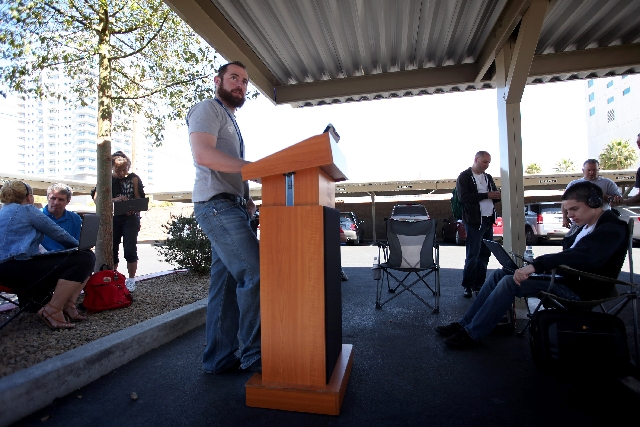Shrewd investors snap up HOA liens, rent out houses

Savvy investors in Las Vegas are buying up small homeowner’s association liens at auction and making money by renting out homes they don’t actually own until the mortgage-holder comes knocking, in some cases as long as two years later.
Community associations can collect up to nine months of unpaid HOA assessments through “superpriority” liens, plus up to $1,900 in collection charges, according to Nevada law. While liens can amount to several thousand dollars when collection fees and other charges are applied, they’re dwarfed by mortgages and in the past have received little notice.
But a 2010 change in state law aimed at preventing improper foreclosures has dramatically expanded the length of time between a mortgage default and the bank taking possession.
And investors have found that the combination of a small HOA debt and the delay in bank foreclosures can lead to a big payoff. That, in turn, is driving bids for liens through the roof.
Danny Garcia, an agent who goes to trustee auctions on behalf of a private client, said he’s seen bids for HOA liens increase from about $6,000 to upward of $30,000 in the past two years. The highest he ever paid was $20,000.
“They’ve gone up,” he said. “People have started to figure out they can settle with the bank. They have some kind of strategy.”
In the past, HOAs seldom went after members for unpaid dues, but cash-strapped associations faced with fewer dues-paying members are now much more likely to go after residents, using collection agencies to place liens on the property.
“If we were talking about this four years ago, it would be a totally different conversation,” said David Stone, president of Nevada Association Services, a collection agency for HOAs.
The HOA writes a “dirty deed” on the home and its collection agency proceeds with foreclosure ahead of the mortgage-holding bank.
“That’s a big problem in this town,” said Zolt Szorenyi, president of Lenders Clearing House Las Vegas, a firm that buys and sells foreclosed homes. “These HOA collection agencies are selling debt to private investment companies and they’re taking them down to the auction and foreclosing on them for nonpayment of HOA dues.”
After the lien is auctioned, buyers get a “quiet title” that allows them to take control of the home and rent it out until the mortgage-holding bank gets around to foreclosing and trying to take possession. If the buyer gets the lien cheap enough and can rent the property long enough, their investment makes money.
Investors are buying HOA foreclosures because traditional trustee foreclosures have dried up, which in turn dried up their rental pool, Stone said.
“I’m having a dozen go every week,” Stone said. “People are picking them up and renting them out. They have fee-simple ownership of the property.”
But like nearly everything in Las Vegas, the lien scheme isn’t a sure bet.
The risk in buying HOA liens is that the holder of the first deed of trust might come in and quickly foreclose, taking possession of the home before the investor can rent it out.
That doesn’t necessarily mean the lien buyer loses everything, though. A conundrum in Nevada law helps investors hedge their bets.
Real estate attorney Zachary Ball said the state’s HOA foreclosure law is “revolutionary” in many ways.
In one chapter of the law, the first deed of trust is never wiped out, he said. Statutes dealing with HOAs say an association’s “superpriority” liens are ahead of the first deed and any other loans.
That means HOA liens are “junior” to the first deed on the mortgage, but they have to be paid off before the title can be transferred to a new owner, said Richard Lee, vice president of Ticor Title of Nevada.
The risk, Garcia said, comes in bidding too much at auction and paying more for the lien than a home is worth. When that happens, investors will try to cut their loss by working out a short sale with the lender for 50 cents to 60 cents on the dollar, he said.
When an investor pays more than the face amount of the lien and collection costs, any excess goes to pay off junior lienholders: property taxes, unpaid garbage bills and the like. Anything left after that is sent to the previous homeowner.
Scott Sibley, publisher of Nevada Legal News, said many HOA management firms are conducting lien sales at their offices. They’re held at different times and in different locations, sometimes in packed conference rooms that restrict the number of bidders, he said.
How much longer the HOA lien scheme will work is unclear.
Lawmakers in Carson City are debating adjustments to AB284, the 2011 law that slowed the foreclosure process by making banks prove their right to take a home rather than processing “robo-signed” documents.
Banks have complained the procedures needless delay inevitable foreclosures, causing a logjam of houses in limbo that can be rented through the HOA lien scheme.
“It’ll be interesting to see how it plays out going forward because the banks are close to reaching an agreement to amend AB284,” Sibley said.
Contact reporter Hubble Smith at hsmith@reviewjournal.com or 702-383-0491.